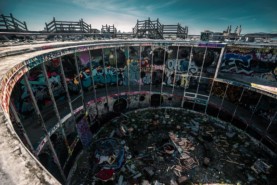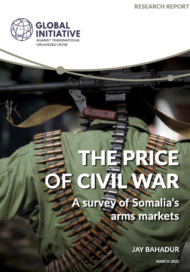Posted on 29 May 2019
Summary and Keywords
Organised crime and criminal networks are an outcome of Africa’s weak systems of state reach and governance, and in turn they further undermine effective state-building. Defining “organized crime” is challenging in the African context. African policy discussions did not use this term until recently, and it is so broad that it covers an enormous range of activity. Nevertheless, it is arguably now generally used and accepted, denoting organized illegal activities by a group of people over time that generate a profit. Such terminology is also now widely referred to internationally and in a UN Convention (which defines an “organized criminal group” but not organized crime itself) to which almost all African states have subscribed. The term “criminal networks” is often also used in African debates, denoting the more flexible and dynamic criminal arrangements that characterize the continent. Organized crime and criminal networks in Africa appear in many different forms, shaped largely by the strength of the state, and the degree that political elites and state actors are themselves involved in them. Broadly, organized crime can be said to occur along a continuum on the continent. On one side are well-established and -organized mafia-style groups such as the hard-core gangs of the Western Cape in South Africa or militia style operations engaged in ‘taxing’ local populations and economic activities, both licit and illicit. In the middle of the continuum, are relatively loose, and often highly effective, criminal networks made up both of Africans (West African criminal networks being the most prominent) and a range of foreign criminal actors seeking opportunities. On the other end, are sets of criminal style entrepreneurs, often operating as companies (the Guptas in South Africa, for example) but with a variety of forms of state protection. Illicit financial outflows in particular are a serious concern, but governance and regulatory reforms will be far more critical than the suppression of illicit markets themselves by law enforcement agencies, given also evidence that suggests a high degree of collusion between some African police and criminals in several illicit markets. Violence too remains a key tool for criminal control and advancement at all points along the spectrum, with the strength of the state and the collusion between state actors and criminal groups often determining the form, intensity and targets of that violence. That is one reason why the link between organized crime and conflict on the continent remains a concern, with actors (who in many cases exhibit criminal or mafia-style attributes) seeking to enhance their resource accumulation by control or taxation of criminal markets. Given this and other factors, the impact of organized crime on Africa’s development is severe, and although in some key markets the illicit economy provides opportunities for livelihood and a source of resilience, these opportunities are negated by the extent of environmental damage, the growth of drug use among the poor and marginalized, human rights abuses of migrants and those being trafficked, the violence engendered, and the economic distortions introduced.
Introduction
In his seminal article, Charles Tilly (1985) argued that the transition from conflict to state-making, at least in Europe, relied heavily on the legitimization of the classic tactic of organized crime—the economy of protection, monopolizing violence in order to leverage taxation from those under your protection. In Africa, organized crime and criminal networks have been an integral part of the formation and evolution of independent, postcolonial states, but they have done little to contribute to state-building.
Whether the trajectory of African states has been largely democratic or autocratic, rent-seeking from local populations, by networks of foreign and local criminal entrepreneurs has been grafted onto the continental tendency toward clientelist social and political governance (Bayart, Ellis, & Hibou, 1999). The strategic involvement in and direction of criminal networks by senior members of African governments and the political elite are key features of organized crime in Africa. Moreover, these networks consistently govern by instrumental violence directed and enabled by the same elite, and enacted by state and non-state actors (Ellis & Shaw, 2015).
Criminal groups in Africa vary from violent criminal gangs in some cities, similar to those you might find in the Americas, to flexible criminal networks and entrepreneurs with state connections and crime-like militias elsewhere. The diversity of criminal structures on the continent has led to challenges to the usefulness of the term in Africa (Reno, 1999). Nevertheless, “organized crime”—denoting broadly a group of people with a degree of organization who act illegally over a period of time to accumulate illicit profit—is what may be referred to as a term of art, widely used in multiple contexts in political and policy debates and increasingly in Africa too. It should be emphasized that African states have almost without exception ratified the United Nations Convention Against Transnational Organised Crime, aligning the continent with the debate on the phenomenon of organized crime globally (only Somalia and South Sudan have not signed or ratified). The ultimate result will be the standardization of terminology, law, and approaches to responding to organized crime across the continent, although there is good reason to be skeptical of both these approaches as well as the commitment of African elites to see them through.
The nature of the African state has played an important role in shaping the manifestation of organized crime, how it is structured, how it raises funds, and how it uses violence. Our analysis suggests that organized crime in Africa sits along a continuum that is largely dictated by the capacity (as measured by an ability to enforce its law and regulate economic activities), and legitimacy of the state in question (Ellis & Shaw, 2015; Shaw, 2018). At one end of the continuum are mainly Africa’s fragile and conflict-torn states and regions, where state institutions have limited to no authority, such as Libya, or where the state has no reach and criminal governance is paramount (Shaw, 2018). Limited or corrupted state reach however can also occur in relatively well-developed states, such as in burgeoning urban settlements, where the state has ceded control to criminal-style formations. In the middle of the continuum, where state authority may be limited in certain geographic areas or segments of society (e.g., in the borderlands), hybrid arrangements exist where the state is involved in protecting illicit markets and criminal networks for profit but may not have direct involvement in those markets. As is the case in the Sahel and West Africa, for example, the state may find its authority challenged by other non-state armed groups which take rents from criminal and legitimate enterprises and deliver some social goods to build legitimacy with local populations (Cockayne, 2016). In those countries where the state is strong, organized crime operates to co-opt key institutions, working toward complicity with the highest levels of the elite, where criminal violence is used strategically to send political signals and suppress opposition, sometimes in the form of assassinations. A combination of these continuum characteristics can also occur in a single state depending on the context and the varying strength or corruptibility of state institutions.
While organized and hierarchical criminal formations are likely to be associated with the lack of or a decline of state reach, so too are looser and more dynamic and adaptive criminal networks. One of the clearest examples of this is the degree to which state instability and conflict in Nigeria since the 1960s has served as a driver for both the global migration of Nigerian citizens and the development of a system of criminal networks across the globe. These networks are now widely regarded as one of the most important systems of global illicit drug transfer, with large Nigerian populations in Latin America (most notably Brazil), South Asia (India and to some extent Pakistan), and Europe (southern Italy in particular). Nigerian organized crime globally remains understudied (however, see Ellis, 2016, for a landmark publication).
On the continent itself, a clear finding from the study of illicit markets is that as the pace of globalization and the integration of international trade have accelerated, so too has Africa’s role in the global criminal economy (Shaw, 2017). Since the year 2000, the association between organized crime and Africa’s conflicts, statehood, governance, and society has intensified and consolidated. Illicit trade, illicit financial flows, kleptocracy, and crime have become pernicious drivers for growing income inequality, the prolongation and exacerbation of conflict, the degradation of the environment, and, consequentially, the further marginalization of the poor and the vulnerable (Reitano & Hunter, 2018).
In this article, we review the criminal geography of organized crime in Africa, its relationship to the process of conflict resolution and democratic transformation, and the implications of that relationship for contemporary patterns of violence, governance, and development. In doing so, we ask the fundamental question—should we understand organized crime in Africa as a form of state-building?
Click here to access the full article



